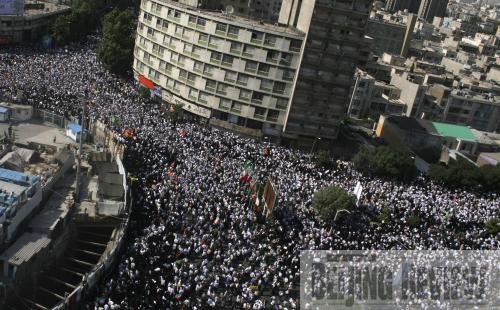|
 |
|
CALL FOR PEACE: Iranian people gather at a rally calling for solidarity in Tehran on June 16, expressing their appeal for national stability (XINHUA) |
After current Iranian President Mahmoud Ahmadinejad won re-election in the country's 10th presidential election, it was inevitable that the world would pay special attention to the development of Iran's interior situation and its relationship with the United States.
During his presidential election campaign, Barack Obama promised he would conduct negotiations with Iran without preconditions. On the day Obama won the election, Ahmadinejad sent him a congratulatory letter that expressed his hope of healing relations between the two countries. Once Obama took office, there was active interaction between the two sides. According to Obama, the United States was willing to carry out direct and constructive dialogue with Iran, and fully participate in nuclear-related negotiations. Washington actually discarded its previous precondition for negotiation, which was that Iran must first halt its nuclear enrichment activities. Supreme Leader Ayatollah Seyyed Ali Khamenei said that if the United States changed its policy, then Iran's attitude would also change. Ahmadinejad also encouraged the United States to adjust its policy, saying that Iran would like to construct a new relationship and conduct equal dialogue on the basis of mutual respect.
High-ranking officials on both sides have also strengthened contact and understanding. U.S. Vice President Joe Biden and Obama's national security adviser General James Jones held a secret meeting with Parliament Speaker Ali Larijani in February during the Munich Conference on Security Policy, after which Larijani said the Iran-U.S. relationship was going to change. U.S. Secretary of State Hillary Clinton said it was unquestionable that the United States would open dialogue with Iran, suggesting that Iran not miss the opportunity to merge into the international community. U.S. and Iranian officials also met in March during the Shanghai Cooperation Organization meeting in Russia and at the International Conference on Afghanistan in the Netherlands, where they discussed the Afghanistan issue.
Before Iran and the United States adjust and heal their relationship, there are some problems they must solve.
First, there are obstacles for the United States to overcome. The two sides are now at an impasse on the nuclear issue. The United States aims to prevent Iran from owning nuclear weapons, while Iran insists on continuing its nuclear research as a strategic imperative. Iran will not bind up its hands in either bilateral or P5+1 [the five permanent members of the UN Security Council plus Germany] negotiations unless the United States responds with substantive moves. Their bilateral relations also involve other problems and issues in the Middle East, such as Iraq, Afghanistan, the Middle East peace process and extremist Islamic organizations in the region. All these issues are related not only to their ideological differences, but also to their fight for regional leadership. Therefore, even if the two sides can sit down at the negotiating table, they still face many difficulties in developing the bilateral relationship because each side has very limited space to compromise, especially on crucial problems. It has been 30 years since Tehran and Washington cut off their diplomatic relations, so the United States must think about how to deal with an unfamiliar Iranian administration. Moreover, it is hard to predict whether the U.S. Congress will approve the Obama administration's adjusted policy towards Iran.
Iran will also find it difficult to mend ties with the United States. Ahmadinejad echoed Obama on February 10 when he said, "Our nation is ready to hold talks based on mutual respect and in a fair atmosphere." But Iran worries that engaging in dialogue and establishing a diplomatic relationship with the United States might be seen as acquiescing to the United States, which would undermine Iran's leadership in the Islamic world. So there are many different voices inside Iran on mending Iran-U.S. ties. The United States requires Iran to change its current stances on Iraq, nuclear proliferation, the Middle East peace process and Islamic extremism. But Iran cannot accept these conditions immediately. For now, the political situation there is still under the control of conservative parties. Therefore, future development of Iran-U.S. relations is still a big question mark.
The author is deputy director of the Division of Developing Countries Studies, China Institute of International Studies |
